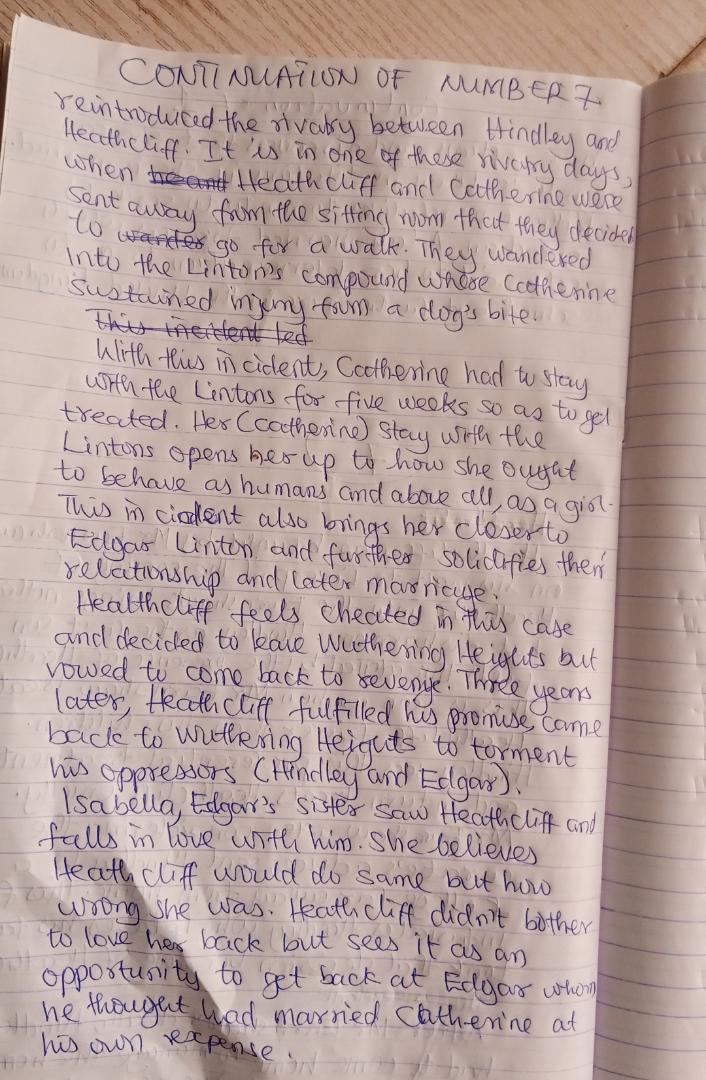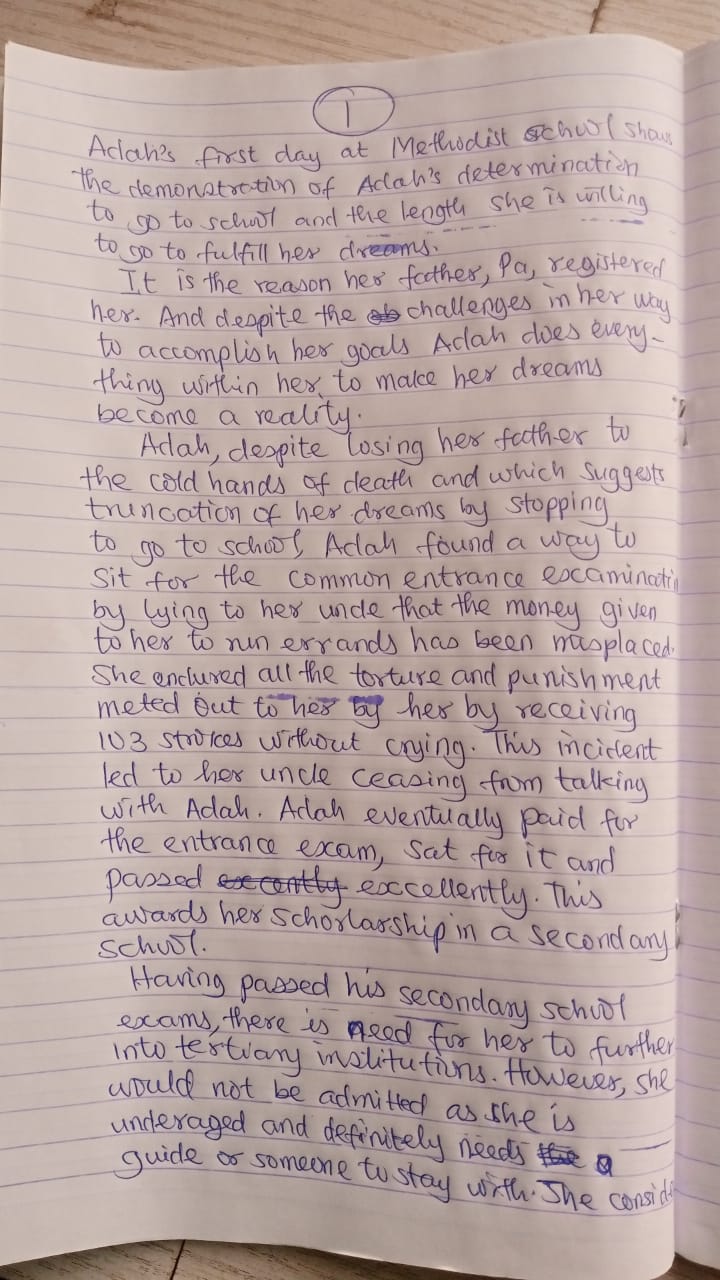
.LITERATURE- OBJ
1-10: DABAAACACA
11:20: DBDDCCDBCA
21-30: DBCDCCBDBA
31-40: CBABAAADAC
41-50: BDBABDDADA
COMPLETED….
PLS USE ONLY THE SOLUTIONS FROM THE BABA TO AVOID FAILURES!!!
WAEC 2023 LITERATURE THEORY ANSWERS
_*QUESTION 1*_
In Buchi Emecheta’s novel “Second Class Citizen,” the main character, Adah, begins attending the Methodist School on her first day in London. This event contributes significantly to the development of the plot in several ways.
Firstly, Adah’s enrollment in the Methodist School marks a significant shift in her life. Prior to this, she had been living in Nigeria, where she faced discrimination and limited opportunities because of her gender. By starting school in London, Adah gains access to education and the possibility of a better future. This sets the stage for her personal growth and development throughout the novel.
Secondly, the Methodist School serves as a microcosm of British society. Adah encounters cultural differences and racism from her classmates and teachers, which reflects the larger societal issues she will face as a black immigrant in England. Her experiences at the school highlight the challenges she will face as she tries to navigate life in a new country.
Finally, Adah’s time at the Methodist School introduces her to new people and experiences that will shape her future. She befriends a classmate named Mary, who becomes one of her closest friends, and she also develops a crush on a boy named Francis. These relationships will play significant roles in Adah’s life as she grows older.
Overall, Adah’s first day at the Methodist School is a pivotal moment in “Second Class Citizen.” It sets the stage for the novel’s exploration of themes such as immigration, discrimination, and personal growth, and introduces characters and experiences that will shape the plot as it unfolds.
=======
*QUESTION 6*
The ideology of the Brotherhood in the novel 1984 is based on a totalitarian form of socialism, which emphasizes the complete control of the state over all aspects of human life. It is an approach characterized by authoritarianism, the use of propaganda, and manipulation of language to maintain power and control.
The Brotherhood claims to be a resistance movement fighting against the oppressive government of Oceania. Its members believe that the current government, led by the dictator Big Brother, has completely corrupted any notion of freedom, justice, and humanity, and therefore needs to be overthrown by any means necessary, including violence.
The ideology of the Brotherhood emphasizes the importance of a classless society that is based on equality; members of the Brotherhood believe that the current society is riddled with social and economic inequalities. They see the current society as being characterized by a small ruling class that has access to resources while the masses languish in poverty.
The Brotherhood believes that the elimination of private property, the abolition of the capitalist system, and the eradication of class distinctions will lead to a more equitable society. The Brotherhood also emphasizes the importance of collective action and a commitment to the common good.
In conclusion, the ideology of the Brotherhood in the novel 1984 is founded on a socialist approach characterized by a totalitarian regime where the state has complete control over individuals. It emphasizes the importance of a classless society based on equality and collective action while taking an approach of eliminating private property, capitalism, and class distinctions.
===========
_*QUESTION 5*_
In Ralph Ellison’s novel “Invisible Man,” the narrator’s grandfather plays a significant role in shaping his actions and worldview. The grandfather’s advice, which is imparted to the narrator in the form of a deathbed speech, emphasizes the importance of self-reliance and individuality in the face of racial oppression.
The grandfather’s words haunt the narrator throughout the novel, and he constantly grapples with their meaning and implications. At times, the narrator embraces his grandfather’s advice and seeks to assert his own identity in the face of societal pressure to conform. For example, he joins the Brotherhood, a political organization that seeks to empower African Americans, but eventually leaves the organization when he realizes that it is not aligned with his own principles.
At other times, the narrator resists his grandfather’s advice and feels trapped by societal expectations. For example, he is forced to participate in a “battle royal,” a brutal boxing match, as part of a white men’s club’s entertainment. He initially protests the event, but ultimately participates in order to secure a scholarship for college.
Overall, the narrator’s grandfather’s advice serves as a constant reminder of the importance of individuality and self-respect in the face of racism and oppression. The narrator struggles to reconcile this advice with the realities of his life, but ultimately comes to understand that his grandfather’s words are a call to action, urging him to fight against the forces that seek to define and control him.
_*QUESTION 8*_
In Emily Bronte’s novel, “Wuthering Heights,” the use of weather, windows, and setting as symbols is a significant aspect of the story. These symbols are used to convey the emotional and psychological states of the characters and to reflect the themes of the novel.
Weather is a recurring symbol throughout the novel, often reflecting the emotional turmoil of the characters. For example, the violent storms that occur frequently in the novel often coincide with moments of intense conflict or passion between characters. The stormy weather also reflects the wild and unpredictable nature of the moors, which are a dominant setting in the novel.
Windows are another important symbol in the novel, representing both barriers and connections between characters. The windows of Wuthering Heights and Thrushcross Grange, the two main houses in the novel, are often used to separate or unite characters. For example, the windows of Wuthering Heights are frequently described as small and high, creating a sense of isolation and confinement for the characters inside. In contrast, the windows of Thrushcross Grange are large and bright, representing the openness and freedom that the characters inside enjoy.
The setting of the novel is also significant, particularly the wild and desolate moors that surround Wuthering Heights and Thrushcross Grange. The moors represent both the untamed nature of the characters and the isolation that they experience. The moors also serve as a metaphor for the emotional landscape of the characters, reflecting their moods and desires.
Overall, the use of weather, windows, and setting as symbols in “Wuthering Heights” adds depth and complexity to the novel’s themes and characters. These symbols help to convey the emotional turmoil and psychological states of the characters, as well as the themes of isolation, confinement, and freedom.
NO7


NO1

====================

Leave a Reply